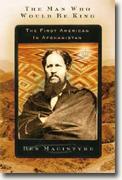Ben Macintyre
book reviews:
· general fiction
· chick lit/romance
· sci-fi/fantasy
· graphic novels
· nonfiction
· audio books
· author interviews
· children's books @
curledupkids.com
· DVD reviews @
curledupdvd.com
newsletter
win books
buy online
links
home
for authors
& publishers
for reviewers

 |
The Man Who Would Be King: The First American in Afghanistan Ben Macintyre Farrar Straus & Giroux Hardcover 368 pages April 2004 |
Halloween disguises for rent in Sioux Falls, SD - king, colonial, mideastern, civil war, soldier and more, plus dinner mystery skits. Masque & Mystery Co. in Sioux Falls, SD.
|
|
It was a great time for empire-building, when a man could style himself a general, a doctor or a mullah, could raise an army on spec and take up a challenge to conquest in lands un-traveled. A time for a man who sought greatness, for a man who would be king. Josiah Harlan, Quaker, was one such man.
Real-life reporter/author Ben Macintyre mixed this material and his own experience in the Middle East to create a rollicking yarn that moves around the world with panache, following the erratic but always fascinating footsteps of a “legend in his own mind,” one Josiah Harlan, bold colorful traveler, doctor, soldier, and pretender of the first order. Fleeing America, nursing a woman's slight that he never forgot, Harlan found himself in India where he signed on as a military surgeon with the East India Company, though he had naught but the most rudimentary experience of medicine. This he parlayed, literally, into a leadership role in a revolutionary army on behalf of a deposed Afghani ruler living in exile. Being American put him somewhere outside the "big game" but still a willing player. He affected uniforms reflecting high rank, acquired a faithful dog and a horse of fine breeding, and marched into Afghanistan, a territory at that time almost totally untried by civilized exploration. Or, to put it another way, those who tried never returned. It is said that when God finished making the world, he had some rocks left over - that became Afghanistan. Reading of Harlan's sojourn there makes it all the more plausible that an enemy could be lost forever in that terrain. Harlan's and Macintyre's shared vision of the Afghani guerillas - sharp-shooting snipers holed up in mountain passes picking off their targets with impunity - reprises today's headlines. Harlan was a master of disguise and could spin a tale or rig a drama to suit his dilemma of the moment. He was sometimes a holy man, reverting to what appeared to be deep silent meditation when language failed. He was of course an ersatz doctor, and army chieftain. He appeared to have little fear, to regard life-threatening scrapes as all part of a grand boyish outing. Kipling would certainly have admired his derring-do, and so will the reader of this action- and fact-filled account. The denouement, Harlan's return to his native land, is the ironic and perhaps predictable portrait of a man who gave out but never gave up. In his grandiose style, he wrote a book of observations about Afghanistan roundly criticizing the British. His Anglophobia lost him supporters and he turned his attention to the camel, recommending it as the ideal beast for our desert sands. Frankly he hoped to be sent by the government to obtain said animals, but was frustrated when Jefferson Davis, convinced by Harlan’s rhetoric, sent another in his place. The camels came and quickly disgraced themselves, unwilling to work alongside horses and ugly into the bargain. Harlan sustained a questionable record of military service in the Civil War, the object of a mutiny from whose humiliation he acquitted himself. He indeed proved a good trainer of ground soldiers, as he had been in his earlier travels. He composed a treatise recommending grape culture in the American west, a land no more hospitable at that time than the Middle East, filled with warring native peoples and an encroaching more organized and determined culture bent on conquest. But that effort, like his camel proposal, bore no fruit. Peripatetic to the end, never really at home as old age overtook his urge for more excitement, Harlan called himself a general and then a physician, and ended his life unknown. His wife used pages of his diaries to start fires and only by mischance or miracle did some portions escape the flame. © 2004 by Barbara Bamberger Scott for Curled Up With a Good Book |
| Other books by Ben Macintyre: |
|
|
|
 Click here to learn more about this month's sponsor! |
|
| fiction · sf/f · comic books · nonfiction · audio newsletter · free book contest · buy books online review index · links · · authors & publishers reviewers |
|
| site by ELBO Computing Resources, Inc. | |
 The tale behind the swashbuckling tale is as remarkable as the tale itself... a writer with a nose for facts tracks down a diary pristine "in an old box, buried and forgotten among the files" in a small museum in Pennsylvania. Thus was uncovered the life history of the man who was almost certainly the model for Kipling's warrior bold, who, like the real-life adventurer, breathes again in a saga recounted by a newspaper man.
The tale behind the swashbuckling tale is as remarkable as the tale itself... a writer with a nose for facts tracks down a diary pristine "in an old box, buried and forgotten among the files" in a small museum in Pennsylvania. Thus was uncovered the life history of the man who was almost certainly the model for Kipling's warrior bold, who, like the real-life adventurer, breathes again in a saga recounted by a newspaper man.